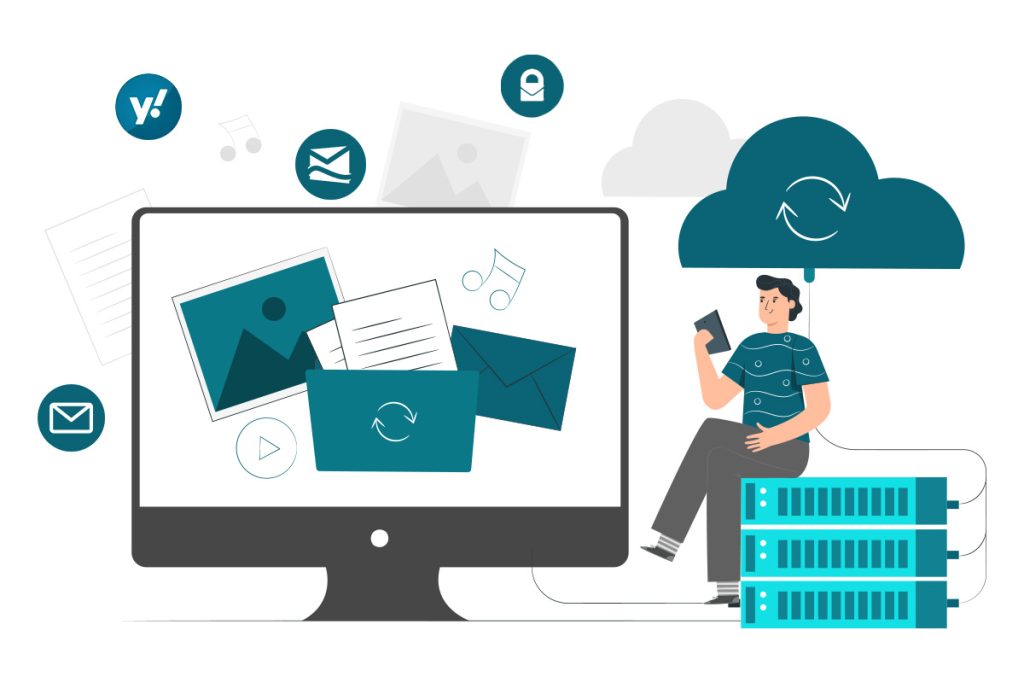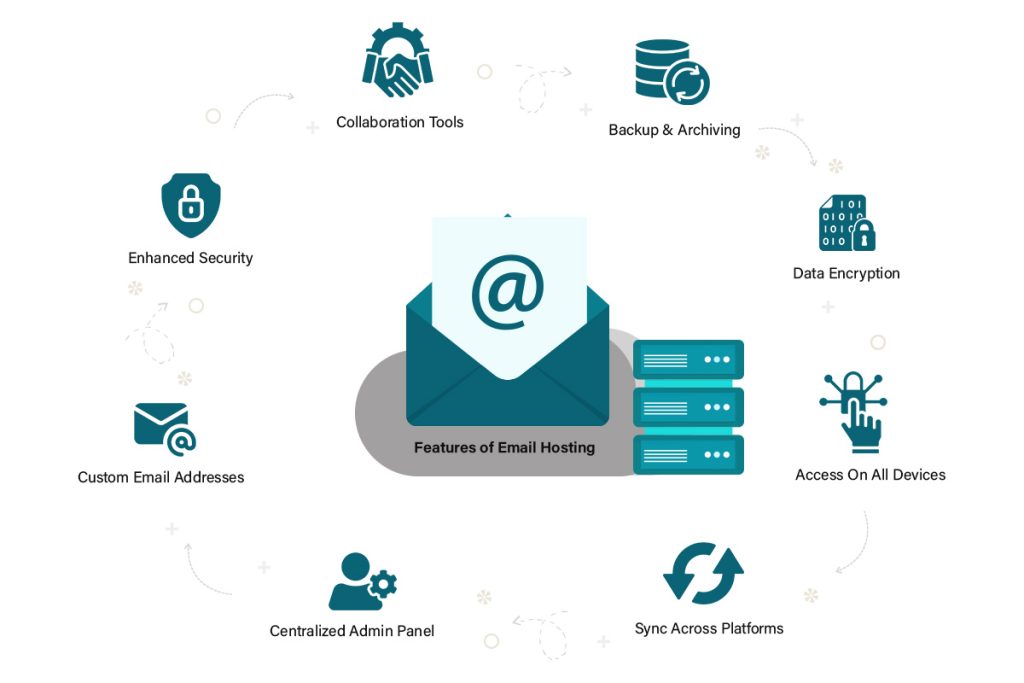Email hosting is a service that allows individuals and businesses to send, receive and store emails on a dedicated server. Unlike free email services that come with limited features and generic domains, email hosting offers more professional, secure and customizable solutions, ideal for both personal branding and business communication. Our WebsCare research team will walk you through the essentials of email hosting, how it works, its benefits and how to choose the right provider to meet your specific needs. Whether you are a freelancer, an entrepreneur or running a full-scale company, understanding email hosting can elevate your communication game to the next level.

Why every business needs a mobile app in today’s digital Age? Let’s read more about it.
What Is Email Hosting?
Email hosting is a service that runs and manages email servers, allowing individuals or businesses to send, receive, and store emails using their own custom domain name (like yourname@yourcompany.com) instead of relying on free services like Gmail or Yahoo. This service typically offers enhanced security, more storage, spam and virus protection, and professional features like collaboration tools, calendar integration and technical support. Email hosting is especially valuable for businesses that want to maintain a professional image, improve reliability and gain better control over their communications.
How Does Email Hosting Work?
The process of sending and receiving emails through a hosted service involves several key components:
Email Client
This is the software or web interface you use to compose, send, read, and manage your emails (e.g., Outlook, Thunderbird, Apple Mail, webmail provided by your host).
Mail Transfer
This is the server software responsible for routing emails between different mail servers. When you send an email, your email client connects to your hosting provider’s MTA.
Mail Delivery
Once an incoming email reaches the recipient’s hosting provider’s MTA, the MDA stores it in the recipient’s mailbox until they retrieve it using their email client.
Mailbox
This is the storage space allocated to each email address on the hosting server where incoming emails are held and sent emails are often saved.
Key Points to Consider for Choosing an Email Hosting Provider:
There are the following points that you must consider
Stay Focused on Faith: Always maintain your commitment to faith and righteousness.
Allah’s Protection: If you are on the right path, you are shielded by Allah’s guidance.
Resilience Against Negativity: Those who are misguided cannot harm you if your heart is guided.
Trust in Allah’s Plan: Place your trust in Allah’s will and protection, and focus on staying true to your beliefs.
Inner Peace: By following the right path, you attain peace and security, no matter the external circumstances.
Types of Email Hosting: Choosing the Right Fit
Email hosting solutions cater to diverse needs and budgets. Here are some common types:
- Shared Email Hosting: This is often the most affordable option, where your email service shares server resources (storage, bandwidth) with other users. It’s suitable for individuals and small businesses with basic email needs. However, performance can be affected by other users on the same server.
- Virtual Private Server (VPS) Email Hosting: A VPS provides a more isolated environment with dedicated resources on a shared physical server. This offers better performance, security, and control compared to shared hosting, making it suitable for growing businesses.
- Dedicated Email Hosting: This provides an entire server dedicated solely to your email needs. It offers the highest level of performance, security, and customization but is also the most expensive option, typically used by large organizations with significant email volume and specific requirements.
- Cloud-Based Email Hosting: Services like Google Workspace (formerly G Suite) and Microsoft 365 offer email hosting as part of a suite of cloud-based productivity tools. These platforms provide scalability, reliability, and often include features like online storage, collaboration tools, and security features.
- Private Email Hosting: This involves setting up and managing your own email server, offering maximum control but requiring significant technical expertise and ongoing maintenance. It’s generally not recommended for most individuals or small businesses.
How to Boost Your E-commerce Sales with Digital Marketing? Let’s read more about it.
Benefits of Using Email Hosting
Opting for email hosting offers numerous advantages over free email services, particularly for professional use:

Professionalism and Branding
Using a custom domain name (e.g., [email address removed]) creates a more professional image for individuals and strengthens brand identity for businesses.
Increased Control and Customization
Hosted email allows for greater control over email accounts, storage quotas, security settings, and spam filtering.
Enhanced Security and Reliability
Reputable email hosting providers invest in robust security measures, including spam and malware protection, and often offer service level agreements (SLAs) guaranteeing uptime and reliability.
Larger Storage and Attachment Limits
Hosted solutions typically offer significantly more storage space for emails and larger file attachment limits compared to free services.
Dedicated Support
Paid email hosting usually includes access to dedicated customer support, which can be crucial for resolving technical issues promptly.
Advanced Features
Depending on the plan, you may gain access to advanced features like email archiving, email marketing tools, collaboration features, and integration with other business applications.
Privacy Considerations
While not always the case, some paid email hosting providers may offer stronger privacy policies compared to free services that often rely on advertising.
Key Features of Email Hosting
Different email hosting providers offer various features but some of the most common and essential ones include:
| Custom Domain Email | Use your own domain name (e.g., info@yourcompany.com). |
| Large Storage Space | Generous mailbox quotas to store years of email. |
| Spam and Virus Protection | Filters to keep your inbox clean and secure. |
| IMAP/POP3 Support | Compatibility with most desktop and mobile email clients. |
| Webmail Access | Ability to access your email via a browser. |
| Collaboration Tools | Calendars, contacts, shared folders (especially in business plans). |
| Reliable Uptime | Email servers with high availability (often 99.9% or better). |
| Data Backup | Regular backups to prevent email loss. |
Choosing the Right Email Hosting Provider: Key Considerations
Selecting the appropriate email hosting provider is a crucial decision. Consider the following factors:
| Criteria | Description |
|---|---|
| Your Needs | Assess current and future email requirements (number of accounts, storage, features). |
| Budget | Determine a budget and explore hosting plans within that price range. |
| Reliability and Uptime | Look for providers with strong uptime and service level agreements (SLAs) ensuring service availability. |
| Security Features | Ensure robust security features such as spam filtering, malware protection, data encryption, and 2FA. |
| Storage and Bandwidth | Choose a plan that offers enough storage for emails/attachments and sufficient bandwidth for sending/receiving. |
| Customer Support | Check for available support channels (phone, email, live chat) and responsiveness. |
| Ease of Use | Consider user-friendly control panel and webmail interface for easy navigation. |
| Scalability | Choose a provider with scalable plans to accommodate future growth. |
| Domain Name Integration | Ensure the provider supports easy integration with custom domains if needed. |
| Additional Features | Evaluate extra features such as email marketing tools, calendar syncing, contact sync, and collaboration tools. |
Looking to grow your brand online and reach the right audience effectively? Let’s find the complete Guide to Digital Marketing Strategies, Insights & Impact.
Conclusion
Email hosting is essential for modern communication, whether you’re a freelancer seeking a professional image or a business aiming for efficient communication. Investing in a reliable email hosting solution ensures security, scalability, and enhances brand credibility. With a wide range of providers and plans available, there’s a solution for personal users, startups, and enterprises. Make your inbox work smarter by choosing the right email hosting strategy for your needs.


